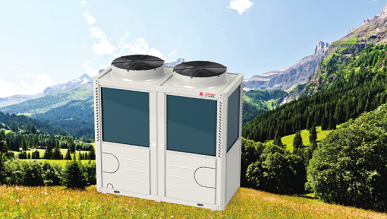
2019-05-17

Air energy heat pump (AEHP) is a kind of heat transfer device that uses the inverse Carnot principle to absorb heat from the air to produce hot water. The heat in the environment is transferred to water by allowing the working medium to continuously complete the thermal cycle of evaporation (absorbing the heat in the environment), compression, condensation (releasing heat), throttling and re evaporation. An important parameter to evaluate the performance of heat pumps is heating capacity. What factors affect the heating capacity of heat pumps?
1. Operation mode of hot water system
When the system mode of constant temperature water make-up and circulating heating is adopted to make hot water, the actual performance coefficient of the heat pump is reduced by more than 20% compared with the theoretical performance coefficient of the direct heating system heated from cold water to hot water because the heat pump unit in the system has been working at medium and high water temperatures.
2. Circulating water flow and scale
From the perspective of most circulating commercial engines on the market at present, due to different pipe resistance losses in actual engineering design, in some engineering systems, the circulating water flow is small, the temperature rise at the heat exchange end is more than 5, and the heat exchange capacity is reduced, so the heat generation capacity of the unit will also be reduced. Scale in pipes and heat exchangers will affect water flow, increase heat resistance of heat exchangers and reduce heat generation of units. Therefore, after working for a certain number of years, the heating capacity of the heat pump unit will decline, and the heating capacity in places with poor water quality will also decline.
3. Impact of climatic conditions
When the ambient temperature of the heat pump unit is raised to 5 ℃, its heating capacity can be increased by more than 5% - 20%. Especially in winter, the heating capacity is greatly affected by the temperature. In the design scheme, the heating capacity and performance system under experimental conditions are often taken as the annual average values of heat pump units, and compared with boiler heating and steam holidays to obtain the conclusion of excellent energy saving effect. However, there is a big deviation between this data and the reality, because the impact of climate conditions in different regions is not considered, such as in the north of the Yangtze River basin, The deviation between the annual average energy efficiency of heat pumps and the energy efficiency under nominal conditions may exceed 20%. Then its heating capacity will decrease accordingly.

Explore more exciting videos

Find reliable purchasing channels

Zhigao Air is happy to serve you

24-hour specialist to solve problems for you

Looking forward to becoming a partner with you
Guangdong GEME Refrigeration Equipment Co., Ltd
Address: No. 31 Eastern Industrial Park,Lishui Town,NanHai,Foshan,Guangdong,China. P.C:528244
24H service telephone:
Guangdong GEME Refrigeration Equipment Co., Ltd. Yue ICP Bei No. 19056255